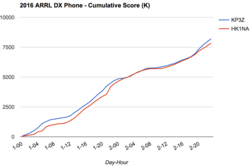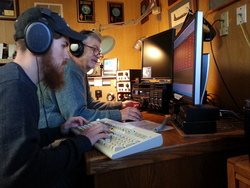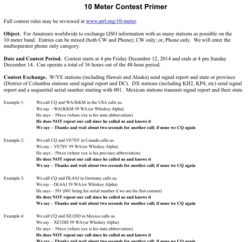 March 23, 2016 Editor: Paul Bourque, N1SFE | |||||||
IN THIS ISSUE
NEW HF OPERATORS -= THINGS TO DO The CQ WW WPX Phone contest is coming up this weekend. This contest has a "Rookie" category overlay for single operators that have been licensed for 3 years or less, and in 2015, KK4TXZ used his Yaesu FT-897 and wire antennas to win that category in the US. According to Mark: "I didn't set my goal to be the winner for the Rookie entry, but I did want to put in a good showing when I started up." I asked Mark whether he had advice for entrants in the Rookie category - see Mark's comments in Records and Results.
The next weekend, in addition to the Missouri and Mississippi QSO parties, the 4-hour-long North American SSB Sprint Contest will occur. Sprints have a unique format, where camping on a frequency is specifically disallowed. You can call CQ on a frequency and work someone, but then it's "their" frequency. You have to move. They get to work someone that calls them, then they have to move. It's fast-paced and can be exciting, fun, and frustrating all at once. There's even a prize drawing among logs submitted with more than 50 contacts. If you're thinking of entering, read the rules on the website, understand the exchange format, and make sure your logging program can handle it. The NA SSB Sprint has experienced a resurgence recently. In February 2015, 367 logs were sent in -- the most ever for this event. BULLETINS 2016 August UHF Contest Cancelled ARRL's VHF Contest Revitalization Committee fielded dozens of comments from members concerning possible changes to the annual UHF contest, historically held on the first weekend of August each year. Many of the commenters expressed dissatisfaction with the timing of the event; it occurred at the hottest time of the year, and its placement on the contest calendar was too close to other VHF/UHF events. In order to address member input, the Revitalization Committee recommended to the Programs and Services Committee (PSC) that the 2016 August UHF Contest be cancelled, and the PSC agreed with the recommendation. The Revitalization Committee continues to study the possibility of redesigning or replacing the August UHF Contest with a similar event at another point in the calendar - possibly in the spring -- for 2017. The Committee expects to solicit comments in the near future as it weighs several design alternatives. BUSTED QSOS Roger, er, Correct! Eric, K3NA, points out "In commercial communications (military, marine, aeronautical), R (or 'roger') simply means 'I received your transmission.' C (or 'correct') is used to answer a question in the positive... I know many hams use 'R' to stand in for 'okay' or 'correct' -- but it really isn't proper and can be confusing. To the extent that contesters, as highly competent radio operators in demanding circumstances, may be called upon to assist in communications emergencies, we should develop the discipline to use the prowords/prosigns that we will find on other radio circuits." Also regarding cut numbers, Alan, AD6E, noted: "Loggers generally do that interpretation internally so if you log ATT then '100' appears in the log. Not sure which loggers, as I'm a Writelog user. With WL, the power is NOT translated, but in Sweepstakes it is translated for NR and CK. It would be nice if things were consistent." Links! "Squeak," AD7K, noted that the correct URL for K1TTT's deconstruction of an LED spotlight should be http://wiki.k1ttt.net/LED%20Bulb%20deconstruction.ashx. Jim, KR9E, correctly noted that the links in the table of contents didn't go anywhere. This was an unfortunate side effect of an uncaught failure of an editing tool. I will endeavor to do better. CONTEST SUMMARY Complete information for all contests follows the Conversation section March 24 RSGB 80m Club Championship, SSB March 25 March 26 March 28 March 30 March 31 April 1 April 2 April 3 North American SSB Sprint Contest April 4 RSGB 80m Club Championship, CW April 5 April 6 NEWS, PRESS RELEASES, AND GENERAL INTEREST Big Guns, Little Pistols, and now "Pea Shooters?" Gary, NA6O, has a great article in the Northern California Contest Club's February 2016 newsletter entitled "Contesting with a Pea-Shooter Station." Gary's perspective is one of attempting ham activities from "denied areas" like those subject to restrictive CC&Rs, rental apartments, or other dampening influences. But his article is really a fun read and chock full of practical advice and hints that will make you a better operator, regardless of your situation. Tony, N2TK, found better basement lighting performance after replacing his fluorescent shop lights with Commercial Electric #54103161 35 W, 3200 Lumen LED fixtures from Home Depot. Each fixture cost about $40 in his area. Besides more light output than the two-tube T12 fixtures they were replacing, they were also RF quiet as indicated on his Elecraft P3. He also was "inspired" to replace 400 W of incandescent lighting in his garage. Four of the newer LED fixtures supply more light than his old setup, with a net savings of 260 W. (N2TK via Elecraft Reflector) The Remote Ham Radio folks have had a youth program running for a number of months where young operators are sponsored to use RHR's well-appointed network of stations with the guidance of experienced operators. Check their website for the program qualifications. WORD TO THE WISE -- "Overlay Category" A contest entry classification used in addition to a standard entry category is an overlay category. An example is in the CQ WW WPX Contest, the "Single Operator" category has a "TB-WIRES" overlay for those stations using a tri-bander beam type of antenna for 20 through 10 meters, and wire antennas for 160 through 40 meters. SIGHTS AND SOUNDS
The SJRA ARRL-Affiliated Club Celebrates 100 years! The South Jersey Radio Association was founded in 1916, and has been an ARRL Affiliated club since 1920. With 2016 being the one hundredth anniversary of its existence, and number of activities are planned, including a 10-day QSO Party in June. Anyone can become a Centennial member of the radio club, and participate as a club member in the 2016 on-the-air activities. Here are sounds of "grow op" RFI that George, K7HBN, had to deal with: "These are clips of the most obnoxious elements of the noise, the interference also included strong carriers throughout the HF spectrum from below 80 meters up to about 15 meters. For instance, on 20 meters, there would be a strong carrier at just below 14 MHz then one at 14.022, 14.024,14.026 14.044 and more through the band and on a panafall display you could see these carriers randomly spaced throughout the HF spectrum. Above about 21 MHz the noise was characteristic of what you might expect from grow light ballasts. The noise on 15, 12, 10, and 6 meters was generally 15 to 25 over S9 compared to S1 or S2 when the lights or whatever were off. I think the noise on the clips may be associated with some "irrigation" system. Although it took some time initially, I was pleased with the response from the FCC inspector, and hopefully this has been totally resolved." The equipment is used for "indoor agricultural operations." It is not permitted by FCC rules for equipment to radiate like this, but unfortunately this situation has become more prevalent as state legalization and licensing of marijuana grow operations has occurred. It may worsen even yet as initiatives to legalize home growing make it through various state legislatures. A state-licensed-and-legal grower should respond to a request to eliminate this RFI, as they likely don't want the attention of any federal (e.g. FCC) agency. A non-licensed operation is a different story. One would think that keeping RFI to a minimum would be a financially prudent minimization of energy costs, and help reduce the chances for detection by AM radio.
Zone 36, Where are you? The Southern California Contest Club met at N6HC's QTH, and some of the operators responsible for your Zone 36 contest multipliers gathered for a group photo. (Thanks Marko, N5ZO) RESULTS AND RECORDS
Bob, N6TV writes: "Here's an interactive chart I created to compare the claimed scores of KP3Z (N6MJ, op) vs. HK1NA (N6KT, op) during the 2016 ARRL DX Phone Contest, hour-by-hour. It was a very close horse race. After 28 hours, they were less than 1000 points apart. At the finish, HK1NA had more QSOs, but KP3Z had more multipliers, especially on 80 meters and 160 meters. Thanks to Danny and Rich for sharing their logs with me." "The CQ WW rate records have now been updated with details from the 2015 CW logs. See http://www.cqww.com/rates/. We have also added the ability to select rates by year. It is interesting to see how many high rate records were set in 2015." -- Randy, K5ZD Logs received so far for the Spring Stew Perry are available. As the USA winner of the CQ WW WPX SSB Rookie Single Operator category in 2015, Mark, KK4TXZ, has this advice for approaching the CQ WW WPX SSB Contest next week: The first words of wisdom I would provide are that you should get a good night of rest prior to the contest, and expect that you're going to be hoarse afterwards. Take breaks, even if it's for 15 minutes. You have to have off time during the contest, so take a break every 1:45-2:00 hours while you're in the chair. Make sure you are familiar with the rules of the class that you plan on entering. Make sure that you are using the correct overlay for the logging software that you choose to use (I use N1MM). I remember my first contest that I made an entry into, I had selected the incorrect overlay, and it pretty much made my entry null. Check the night before to make sure that there haven't been any changes. There's been more than one instance where this has happened. The second is to perform a test on your equipment at least 2 hours prior to the contest. It's good to do a SWR reading on your antennas to make sure that everything is working outside of the shack. Once you have that within your desired settings, then hook everything up, to ensure that no gremlins have attacked it overnight. Have a copy of Murphy's Laws in your shack, as well as a copy of your band plan, to ensure you're operating within your license privileges. The night prior to the contest, I checked everything out at my station, including the antennas, and I left my PC running for the night. I was under the assumption that I could just sit in the chair, and get to work. When the time to kick off came, I got blown away by the high power stations. The key to performing well is just patience, and persistence. If you can't get through to a station after calling several times, move on the dial (if you're doing a S&P). I found that the majority of the calls that I got through to happened after the big guns were searching for "fresh meat". Make sure that your call is repeated back to you correctly, and you confirm the call of the station when you record it in your log (properly!). It's frustrating to have points deducted when you did make a QSO, and to have those deductions made after you did make contact, but human error caused recording of it to be inaccurate. Lastly, I'd recommend that you set realistic goals for your experience. When I entered, I wanted to just get some contesting experience, and as time went on, I saw that my score was rising pretty darn quickly. Of course, the hour and a half that I missed at the beginning while trying to get my logging/spotting software to work out right didn't help, and rather frustrated me further didn't help, but in the end, I found it to be a great learning experience! Rick, N6RK, commenting on the recent Stew Perry contest: "I felt like a slowpoke sending at 20 to 24 WPM while some stations were zooming along at 30 WPM. I just think that top band needs the slower speed. Rates are not high enough that a few extra seconds per QSO matters in this contest. Also, you actually lose time if high speed causes you to have to ask for a fill." OPERATING TIP In ARRL Contests, it's against the rules, and unethical, to "use more than one call sign from any given station location in a single contest" - see Rule 3.3. There is an exception, Rule 3.5, for shared use of a "family station," however the operator must be different. According to Ward, N0AX: "One of the log checkers has 'noticed' some folks working stations multiple times with different calls -- club calls, old personal calls, etc. Once you know what to look for, it's obvious in the logs. While this was once a relatively common practice, it's frowned on (or illegal) today -- we should not do it. Don't work your buddies with multiple calls - just don't." TECHNICAL TOPICS AND INFORMATION AG1LE is controlling his KX3 from his Android phone. He's used a Raspberry Pi 2 as a server, along with a Mumble codec for the audio; those pieces could be applicable to any rig. "I've been playing with a pre-production model of the Arduino MKR1000 (Maker 1000) board using the Atmel ATSAMW25 SoC chip that includes Wi-Fi on a 'gum stick' form factor board. It is super easy to do IoT (Internet of Things) with it. Look for it to become available in the next few weeks at about the $20 price point." (Perry, K4PWO) If you need a font for your website that has ASCII zero represented with a slash, one choice is named Anonymous Pro. However, it's still a mono-spaced font. Radar is being developed by the military that uses a waveform that will be hard to distinguish from noise. The lack of a identifiable signature will help disguise its use. The amateur bands already are already subject to intrusion by signals that we can today identify as radar. If this type of technology becomes pervasive, will we just have more "noise?" The Embedded Systems Conference is in Boston on April 13-14. If you're involved in the embedded electronics industry, you may qualify for free admission. While the focus is on embedded computers and IoT, at least one of the exhibitors, Rohde & Schwarz, should be a familiar name from the RF side. CONVERSATION Contesting needs you...to share your station with new contesters! "We need more young contesters!" - It's a familiar lament. It's driven by the average reported age of recent contesting surveys, and the yearly post-ARRL-Sweepstakes observations of the "first licensed" year part of the exchange. A "head survey" at any meeting shows the predominant hair color (when there is hair) to be gray. "This is a problem we need to solve!" So we try. We demographic-centroid-dwellers put together events and activities to convert non-contesters to contesters. If we were selling something, and perhaps we are, we'd call this the "funnel." A non-contester goes through a number of steps to learn of contesting, learn about contesting, participate in contesting, and "become a contester" by participating on their own. Improving our numbers is all about understanding what we can do at each step of the way. The "top of the funnel" is where a candidate gets exposure to contesting, like at your club's Field Day operation at a local park. There could be non-hams lurking about, so the answer to the question "What's amateur radio good for?" should be crisp, relevant, and tuned to your audience, as some of the things that made the hobby so full of the magic and wonder for us in our youth rate just a "meh" from today's young people. "I like to enter contests where the goal is to exchange information with as many people from as many different countries around the world in a limited amount of time," is one I've used. Stan, K5GO, who is on the Contest Advisory Committee subcommittee working on youth in contesting issues, sent me an e-mail in which he suggested how the use of a reasonably equipped station, with reasonable antennas for all bands of relevance with guidance from a seasoned contester could accelerate the "learning phase."
As a contester, consider making your station and your time available to potential new contesters by inviting them over to help operate your station for parts of other contests beyond Field Day and Kids Day. The goal will be to "win" by having your guest operator(s) learn and have a positive experience. You might want to recruit help from others in your contest or radio club, and make sure you're sensitive to parental concerns about time commitments, homework, supervision, and the like.
You should involve recruits in contest planning, including overall strategy, and specific plans for their operating interval. Help them start to think like a contester, considering band conditions, multipliers, rates, and the like - tell them how you think about the contest and what you think is important. As the control operator, you should plan to be closely monitoring operations during the contest to answer questions and provide guidance. Also remember that for DX contacts, if you have a non-licensed operator, third-party traffic rules apply. Countries that are not on the third-party list may not be contacted by an unlicensed operator. Keep the operating session reasonably short and focused and be on the lookout for fatigue or frustration from your contester-in-training. Try running, searching and pouncing, and multiplier hunting as your candidate can absorb the experiences. Be ready to modify your planned operation to keep it fun for your guest. If you do this, please share the results of your station-sharing effort with Stan, K5GO, or send them to me and I'll forward them on. 73, Brian N9ADG That's all of the contest update goodness for this time. Remember to send your contesting related tips, techniques, surplus equipment, press releases, errata, pictures, stories, blog links, and Twitter handles to [email protected]. CONTESTS 24 Mar - 6 Apr 2016 An expanded, downloadable version of QST's Contest Corral in PDF format is available. Check the sponsor's website for information on operating time restrictions and other instructions. HF CONTESTS CWops Mini-CWT Test, Mar 23, 1300z to Mar 23, 1400z, Mar 23, 1900z to Mar 23, 2000z, Mar 24, 0300z to Mar 24, 0400z; CW; Bands: 160, 80, 40, 20, 15, 10m; Member: Name + Member No., non-Member: Name + (state/province/country); Logs due: March 26. VHF+ CONTESTS UBA Spring Contest, 6m, Apr 3, 0600z to Apr 3, 1000z; CW, Phone; Bands: 6m Only; ON: RS(T) + Serial No. + UBA Section, non-ON: RS(T) + Serial No.; Logs due: April 17. LOG DUE DATES March 24, 2016 March 25, 2016 March 26, 2016 March 27, 2016 March 28, 2016 March 29, 2016 March 31, 2016 April 2, 2016 April 3, 2016 April 4, 2016 April 5, 2016 ARRL Information Click here to advertise in this newsletter, space subject to availability. Your One-Stop Resource for Amateur Radio News and Information ARRL membership includes QST, Amateur Radio's most popular and informative journal, delivered to your mailbox each month. Subscribe to NCJ - the National Contest Journal. Published bimonthly, features articles by top contesters, letters, hints, statistics, scores, NA Sprint and QSO Parties. Subscribe to QEX - A Forum for Communications Experimenters. Published bimonthly, features technical articles, construction projects, columns and other items of interest to radio amateurs and communications professionals. Free of charge to ARRL members: Subscribe to The ARRL Letter (weekly digest of news and information), the ARES E-Letter (monthly public service and emergency communications news), Division and Section news -- and much more! ARRL offers a wide array of products to enhance your enjoyment of Amateur Radio. Visit the site often for new publications, specials and sales. Donate to the fund of your choice -- support programs not funded by member dues! Reprint permission can be obtained by sending email to [email protected] with a description of the material and the reprint publication. ACKNOWLEDGEMENTS ARRL Contest Update wishes to acknowledge information from WA7BNM's Contest Calendar and SM3CER's Contest Calendar. | |||||||
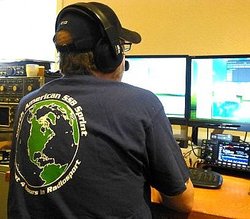
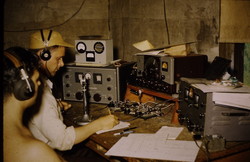
.JPG)
